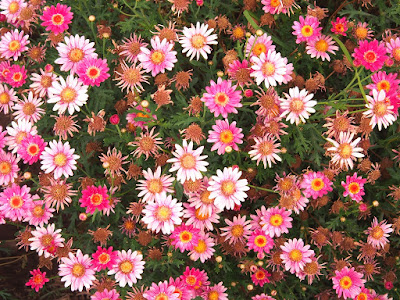We left our
hotel at 7:30 am. On our way out of the city we had a look at a natural viewpoint of of Cusco situated at a height of 11,811 feet. On top of the mountain there is a statue called Cristo Blanco (Spanish for "white Christ"). We could also see the fortified complex of Saksaywaman, where I had hoped to visit yesterday.
Today's main destination - the Sacred Valley.
Our first stop was at the remains of Pisac. We have a new guide today, James, who told us these places are not 'ruins' because they have not been destroyed.
Today's main destination - the Sacred Valley.
Our first stop was at the remains of Pisac. We have a new guide today, James, who told us these places are not 'ruins' because they have not been destroyed.
We could see
the terraced land way before we climbed (with the bus, haha!) to the parking
area. It was a madhouse up there, with many large busses, and vans. There was
one lane left and vehicles had to back up to get back down the hill.
The valley
and surrounding mountains are absolutely gorgeous! The area has been inhabited
since the 10th or 11th century. The terraces were used for agricultural
purposes and at the top is a fort. In another direction are cave tombs,
ransacked by grave robbers centuries ago.
The sun kept
changing and illuminating various parts of the landscape and I took way too
many photos!
Next, we
drove to a GAdventures women's weaving cooperative where we got to feed the
llamas and alpacas. Llamas are bigger and more of a work animal. The alpaca are
smaller and prized for their wool.
While the guide from the coop was talking,
she was also turning the raw wool into yarn with her hands. She talked in
Quechua and James translated for us. She talked about the meaning of the
various designs and what they meant.
We went over
to learn how the wool was dyed. All natural plants are used in the process and
by combining the various dyes, they can make over 20 different colour-fast
shades. The wool is boiled in the dye in metal pots over an outdoor wood stove.
We saw the traditional way of weaving as well as the way it is done now. Then we had some time to view the various handicrafts for sale around the square. I found a lovely table runner, some hot mats, and a red, black and white toque that will match my winter jacket quite nicely!
We saw the traditional way of weaving as well as the way it is done now. Then we had some time to view the various handicrafts for sale around the square. I found a lovely table runner, some hot mats, and a red, black and white toque that will match my winter jacket quite nicely!
The valley
is beautiful all along the way and I took so many photos today, I not only
needed to change batteries but also memory cards.
Lunch was at
another GAdventures sponsored business - a restaurant run by women. There were
so very many interesting courses - buns, soup, salad, quinoa and ? I don't
recall the names of everything but I have probably 10 different photos of the
meal!
 |
| NOT our lunch!!! |
We had time
for a much-needed nap on the bus before arriving at the Ollantaytambo remains.
People have lived here since the 13th century. When I saw the height of the
climb I thought, "No way". But I took it bit by bit, stopping to rest
and catch my breath and I did it!
At the top,
I was rewarded with some stunning views as well as a closer look at the Fort
and the Temple of the Sun. The stonework was expertly done by the Incas and it
is the site for the greatest Incan victory over the Spaniards. However the
Spaniards gained control of it again in 1537.
At the
bottom, there was a section of aqueducts where the water has been channeled
from the river.
We stayed til closing time (5 pm), then drove about 30 minutes
to our hotel, the Villa Urumbamba. The grounds are beautiful, the rooms are
basic.
 |
| These girls sang for us |
I ordered
chicken soup for supper and had them bring it to my room. It's another early morning
and we cannot take our big suitcases on the train tomorrow so I must repack,
bringing only the essentials.































